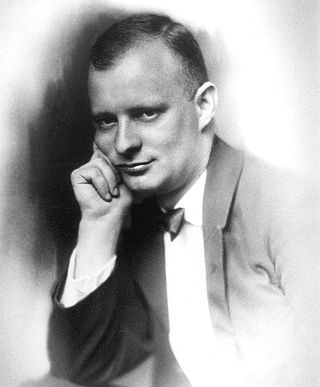Related Research Articles

Opera in German is that of the German-speaking countries, which include Germany, Austria, and the historic German states that pre-date those countries.

Ernst Heinrich Krenek was an Austrian, later American, composer. He explored atonality and other modern styles and wrote a number of books, including Music Here and Now (1939), a study of Johannes Ockeghem (1953), and Horizons Circled: Reflections on my Music (1974). Krenek wrote two pieces using the pseudonym Thornton Winsloe.

The Leipzig Opera is an opera house and opera company located at the Augustusplatz and the Inner City Ring Road at its east side in Leipzig's district Mitte, Germany.

Lothar Zagrosek is a German conductor. As a youth, he sang in the Regensburg Cathedral choir, including performances as the First Boy in The Magic Flute at the 1954 Salzburg Festival. From 1962 to 1967, Zagrosek studied conducting with Hans Swarowsky, István Kertész, Bruno Maderna and Herbert von Karajan.

Von heute auf morgen is a one act opera composed by Arnold Schoenberg, to a German libretto by "Max Blonda", the pseudonym of Gertrud Schoenberg, the composer's wife. It is the composer's opus 32.

Jonny spielt auf, Op. 45, is a German-language Zeitoper with words and music by Austrian composer Ernst Krenek about a jazz violinist. He dedicated the opera to his second wife, Berta Herrmann. A performance lasts about two hours. The work typified the cultural freedom of the 'golden era' of the Weimar Republic.

Karl V. is an opera, described as a Bühnenwerk mit Musik by Ernst Krenek, his opus 73. The German libretto is by the composer. His student Virginia Seay collaborated with him on the English translation of the libretto.

Der Zar lässt sich photographieren is an opera buffa in one act by Kurt Weill, op. 21. The German libretto was written by Georg Kaiser, and Weill composed the music in 1927. It is a Zeitoper, a genre of music theatre which used contemporary settings and characters, satiric plots which often include technology and machinery. Musically the Zeitoper genre tends to be eclectic and borrow from Jazz. The genre has practically disappeared from the world's opera houses. Historically the Zeitoper came to an abrupt end with the Nazi period, and after the war the cultural institutions were perhaps hesitant to return to the lighter, often decadent and comic operas written before the holocaust changed the artistic perspective. This conjecture is supported by the statistical fact that of all of Weill's, Schönberg's, Hindemith's and Krenek's works – it is these very shorter, satirical Zeitoper works that are no longer performed.

Schwergewicht, oder Die Ehre der Nation is a burleske Operette with text and music by Ernst Krenek, his Op. 55 and the third of his 1928 one-acters. This satirical skit was provoked by the German ambassador's comment that sports heroes – and not artists – were the true ambassadors of nations, and the title character Ochsenschwanz ("oxtail") is a reference to the boxer Max Schmeling.
Leben des Orest is a grand opera in five acts with words and music both by Ernst Krenek. It is his Op. 60 and the first of his own libretti with an antique setting. The score is inscribed with the dates of composition, 8 August 1928 – 13 May 1929, and includes indications of recommended cuts made for the first production. It premiered at the Neues Theater in Leipzig on 19 January 1930, and opened at the Kroll Opera House in Berlin in early March of the same year.

Hin und zurück is an operatic 'sketch' in one scene by Paul Hindemith, with a German libretto by Marcellus Schiffer. It acts as a parody of conventional opera tropes featuring a coloratura ariette, a jealousy duet, and a terzet for the tenor, baritone and bass.

Karl Aagaard Østvig was a Norwegian operatic tenor, opera director, and voice teacher. The Norwegian Music History Archive states that he is the greatest dramatic tenor in Norwegian history, and that he was particularly admired for his portrayals in operas by Giacomo Puccini, Richard Strauss and above all Richard Wagner. His voice was described by soprano Lotte Lehmann as “a dazzling meteor.” Although he toured internationally in concerts, operas, and recitals, his singing career was mainly centered in Austria and Germany from his debut in 1914 up until his retirement from the stage in 1933. From 1932 on he lived in Oslo where he was primarily active as an opera director and singing teacher. He made only a few recordings during his career, all for Polydor Records.

Negermusik was a derogatory term used by the Nazi Party during the Third Reich to demonize musical styles that had been invented by black people such as blues and jazz. The Nazi Party viewed these musical styles as degenerate works created by an "inferior" race and they were therefore prohibited. The term, at that same time, was also applied to indigenous music styles of black Africans.
Das geheime Königreich is an opera in one act with words and music by Ernst Krenek, his Op. 50 and the second of three one-acters which premiered on 6 May 1928 at the Hessisches Staatstheater Wiesbaden as part of the Mai-Festwoche Wiesbaden. It is subtitled Märchenoper in 1 Akt and has been called a satirical fairy-tale opera.
Christophorus (oder Die Vision einer Oper) is an opera in a prologue, two acts and epilogue by Franz Schreker with a German-language libretto by the composer.

Gustav Brecher was a German conductor, composer, and music critic. As director of the Leipzig Opera, he conducted world premieres of works by Ernst Krenek and Kurt Weill, including Jonny spielt auf and Rise and Fall of the City of Mahagonny. He was dismissed by the Nazis in 1933, lived at risk in Stalingrad, Berlin, Prague, and finally Ostend, where he took his life together with his wife's.
Erik Wirl was a German operatic tenor and actor.
Ernst Praetorius was a German conductor, General Music Director, university lecturer and music historian.

Harry Stangenberg was a Swedish opera director and from 1927 the head of the Staatstheater Stuttgart. He was expelled by the National Socialists in 1933.
References
Notes
Sources
- Sadie, Stanley (ed.) (1998): "Zeitoper" in The New Grove Dictionary of Opera , London. ISBN 0-333-73432-7
- Warrack, John and West, Ewan (1992), The Oxford Dictionary of Opera, 782 pages, ISBN 0-19-869164-5
Further reading
- Cook, Susan C. (1988), Opera for a New Republic: the Zeitopern of Krenek, Weill and Hindemith. University of Michigan.